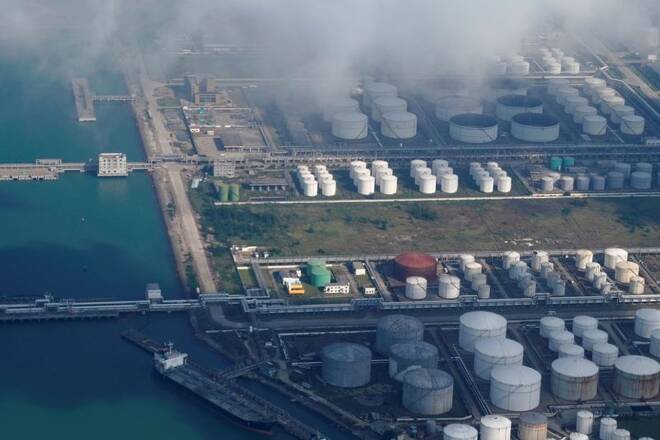Advertisement
Advertisement
China may extend refined fuel export quota into next year – sources
By:
By Chen Aizhu and Jing Xu SINGAPORE/BEIJING (Reuters) - China may tweak a proposed sharp increase in refined fuel export quotas for this year by extending the plan into next year, as it weighs the benefits to the economy of higher exports against low domestic stocks and operational challenges, four sources told Reuters.
By Chen Aizhu and Jing Xu
SINGAPORE/BEIJING (Reuters) -China may tweak a proposed sharp increase in refined fuel export quotas for this year by extending the plan into next year, as it weighs the benefits to the economy of higher exports against low domestic stocks and operational challenges, four sources told Reuters.
However, the four sources with direct knowledge of the matter – and three others – said the government was still reviewing the matter.
The market has been widely expecting China to release a fifth batch of fuel export quota of up to 15 million tonnes for the rest of the year, which would be its largest so far in 2022 and lift China’s sagging exports.
The proposal from refiners’ planning departments, following a government call to boost trade, has led some refiners to ready an increase in output to take advantage of the quota.
However, the four sources said Beijing might extend the duration of the proposed volume of 15 million tonnes into next year to cushion its impact on global markets and avoid a price crash.
The National Development and Reform Commission, China’s powerful economic planner, was hosting a meeting with the nation’s major oil refiners earlier on Wednesday, the sources said. It was not immediately clear if the meeting reached a decision.
The meeting reviewed companies’ oil trading activities and their production capacities this year and also discussed the global oil market outlook for 2023, the four sources said.
“The government believes that domestic refiners were operating at low levels this year due to weak domestic demand and negative impact of COVID controls,” said one of the sources.
“Raising the quotas could help boost overall exports and also help refiners to raise runs,” this person added.
Global oil markets have been supported by a sharp reduction in Chinese fuel exports for most of this year.
However, the proposed large volume of export quotas caused Asian refiners’ margins for diesel, jet fuel and gasoline to slump two weeks ago, although middle distillates products have recovered somewhat.
The proposed volume would mean a 63% jump from the 24 million tonnes released so far for 2022, too large to be practical and risk crashing refiners’ margins, said officials at state refiners.
“This rumoured size is simply not feasible,” said a Beijing-based state oil official involved in refinery production planning.
“Refiners need two to three months to procure the crude oil so you may end up missing the most opportune window for exports,” the official said, adding his company’s inventories of crude oil and refined products were at levels “lower than normal”.
The sources declined to be named as they’re not authorised to speak to the press. China’s Ministry of Commerce and the NDRC did not immediately respond to requests for comment.
The quotas are typically allocated to China National Petroleum Corp, China Petrochemical Corp, China National Offshore Oil Company, Sinochem Group, China National Aviation Fuel Company and private refiner Zhejiang Petrochemical Corp.
(Additional reporting by Florence TanEditing by Mark Potter)
About the Author
Reuterscontributor
Reuters, the news and media division of Thomson Reuters, is the world’s largest international multimedia news provider reaching more than one billion people every day. Reuters provides trusted business, financial, national, and international news to professionals via Thomson Reuters desktops, the world's media organizations, and directly to consumers at Reuters.com and via Reuters TV. Learn more about Thomson Reuters products:
Advertisement
